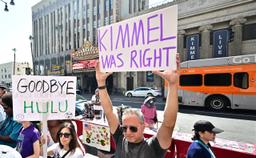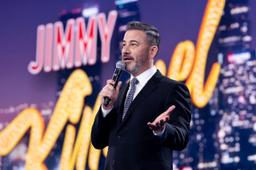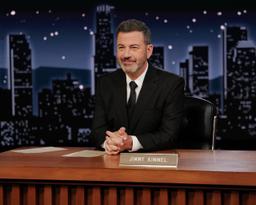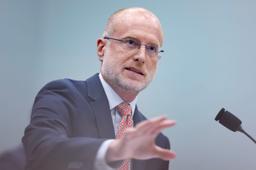On Tuesday, Jimmy Kimmel Live! returned to ABC. Kimmel's show had been suspended since last week after FCC Chairman Brendan Carr attacked Kimmel's comments on the killing of the far-right activist Charlie Kirk. Carr had threatened ABC's parent company, Disney, with government action if it failed to discipline Kimmel, saying, "We can do this the easy way or the hard way." The suspension prompted a nationwide outcry against the Trump administration's evident attack on freedom of speech. Disney reinstated Kimmel after reportedly hemorrhaging subscribers following the suspension, which came just before the company had planned to announce a new price hike. (Trump, a longtime Kimmel hater, gloated over the suspension and renewed his attacks on the comedian after it was lifted.)
But even though ABC is airing Kimmel again, two little-known media companies, Nexstar Media Group and Sinclair Broadcast Group, are keeping him off the air in dozens of cities around the country. How is that possible, and what does it say about the present and future of American media in an increasingly corrupt political environment? Let's discuss!
So after all that hullabaloo, Jimmy Kimmel Live! is back on the air?
As of Tuesday, yes.
Then I can watch the show as usual?
Not so fast!
What does that mean?
It means that Disney, which owns ABC, has put Kimmel back on the network. But two large media conglomerates that own a bunch of local ABC affiliates are still refusing to air the show. These two conglomerates control a total of 66 ABC stations in areas ranging from small-town Nebraska to St. Louis to Portland, Oregon, and if you happen to live in a region served by one of those stations, you won't get Kimmel on your TV.
What on earth is a "local affiliate"? If ABC is showing Kimmel, it seems like I should be able to watch Kimmel on ABC, right?
Think of ABC as Nike and local affiliates as shoe stores. If Nike drops a new sneaker, but the shoe store down the street declines to carry it, you may not be able to buy it in your town.
Broadly speaking, ABC makes the shows, and local TV stations beam the shows into your house. ABC has a nationwide group—or "network," if you will—of local stations that have agreed to run ABC's content. When you turn on an ABC station and see it identified as, say, "KMZ, North Carwood's Home of News, Sports, and Entertainment," ABC is the network and KMZ is the local station.
This is why network channels, unlike a lot of their cable counterparts, don't always air the same stuff everywhere 24 hours a day. Local news and weather are the obvious examples; they're produced by the individual station rather than by ABC itself. Networks don't put out a lot of afternoon content, so the classic after-school mix of sitcom reruns and game shows and syndicated shows—Judge Mathis, et al.—is put together by the individual affiliate. Sports also vary by location; if you live in Philly, you're more likely to get an Eagles game on your local affiliate, and if you live in Chicago, you're more likely to get a Bears game.
Normally, local affiliates air network blocs—think prime-time and late-night shows—in their entirety. But they don't have to. If there's a major emergency where you live, for instance, your local station may cut into Shark Tank to let you know that the aquarium flooded and sharks are now swimming down Main Street. This is called "preempting" the network show, and it's what the local affiliates that won't air Kimmel are doing during his time slot. Nike's making the shoes; the local shoe store won't sell them.
So 66 local affiliates are all refusing to air Kimmel? That's so many!
No. Just two companies are refusing: Sinclair and Nexstar.
But you said that the show wouldn't air in 66 separate local markets.
Yes. But we live in an era of media consolidation, and more specifically, we live in an era when conservative-leaning conglomerates are buying up as many local media organizations—newspapers, TV stations—as they can. Sinclair and Nexstar are the two largest TV station operators in the United States, having bought up hundreds of ABC, NBC, CBS, and Fox affiliates in the past 25 years. They're both MAGA friendly (Sinclair in particular), and they've used their power in local broadcast markets to tilt news coverage to the right, particularly in rural communities and small-to-medium-sized cities.
So even though Kimmel will be blacked out in 66 markets, the decision to keep his show off the air was made by just two companies, and probably by a handful of people within those two companies.
Wow. So it sounds like there's a power struggle between the conservative conglomerates and the national broadcast networks.
That's one of the stories here, absolutely. It's easy to look at the networks as all-powerful media behemoths and their affiliates as hapless little repositories of local weirdness. ("Stay classy, San Diego!") But as the conglomerates controlling affiliate stations have gotten bigger and bigger, they've arguably amassed enough power to rival the networks themselves, albeit in a way that—because it's distributed among hundreds of local areas rather than operating at the national level—is harder to see or to counteract.
Money may not be the best way to measure this power, but it's the easiest one to look at. Nexstar and Sinclair reported a combined total of $8.95 billion in revenue in 2024. Disney doesn't break out ABC's revenue individually in its earnings reports, but its entire linear networks division—which includes ESPN, the Disney Channel, and National Geographic as well as ABC—reported $2.4 billion in the fiscal quarter that ended on March 29. So a little back-of-the-envelope math would suggest that, at the very least, ABC isn't generating much more revenue than Sinclair and Nexstar collectively at the moment. It's probably generating less.
Also consider that ABC's nationwide footprint is made up of something like 226 local stations. Sinclair's and Nexstar's 66 affiliates thus give them direct control over almost 30 percent of ABC's entire network—as well as large slices of NBC's, CBS's, and Fox's. These are companies with enormous power to shape the information and entertainment environments of tens of millions of Americans, and they've been exercising that power for years without most Americans even knowing they exist. Now, it seems, they've decided to exercise it even more aggressively.
And they're keeping Kimmel off the air out of a sincere disagreement with his views on the Charlie Kirk killing?
Oh my God, no. If you take Nexstar and Sinclair at their word, then sure, they're full of moral outrage against Kimmel. Andrew Alford, the president of Nexstar's broadcast division, attacked Kimmel's comments as "offensive and insensitive at a critical time in our national political discourse," and Sinclair called on Kimmel to apologize to Kirk's family.
What neither of these statements acknowledged, however, is that—and please, prepare yourself for the most 2025 revelation you've seen all day—both Nexstar and Sinclair have strong business incentives to appease Trump's FCC. Nexstar requires FCC approval to complete a proposed $6.2 billion merger with Tegna, which owns 13 ABC affiliate stations. Sinclair put out a statement on August 11 in which it said that it was authorizing "a comprehensive strategic review for its Broadcast business." For those not fluent in business school speak: CNBC wrote that this "could result in a merger" and reported that "the company and its advisors have already held deep discussions with potential merger partners." If a deal were to materialize, it would require FCC approval.
Let's look at that fact one more time:
One of the conglomerates keeping Kimmel off the air requires FCC approval for a potential merger. The other is reportedly exploring options for a potential merger.
So, yeah. There are other reasons Nexstar and Sinclair would choose to keep Kimmel off the air. If either or both succeeded in completing mergers, their leaders would make a stupid amount of money, and the newly created superconglomerate(s) would have vastly increased power over American media (their power over which, as we've seen, was considerable to begin with).
But mergers don't get approved in America just because a corporation pulls the plug on a comedian the president dislikes, surely?
This summer, Paramount—which was in the middle of seeking approval to merge with Skydance, a media company owned by the son of conservative billionaire Larry Ellison—canceled Stephen Colbert's Late Show after Colbert accused Trump of corruption. A few days later, the merger was approved by the FCC.
Ah.
Yes, it's the subtlety of the corruption that makes our moment particularly delightful.
In any case, if you're in Tulsa, Rochester, Columbus, Chattanooga, Tuscaloosa, Little Rock, or any of the dozens of other cities with Sinclair- or Nexstar-controlled ABC affiliates, you won't be able to watch Live when it airs on TV. But don't despair—the future of American television may be full of grotesque corporate mergers and regulatory corruption, but then, the future of American television may not be television at all. Jimmy Kimmel's nightly audience is somewhere between 1 million and 2 million viewers. His opening monologue from Tuesday night's show has already been viewed more than 13 million times on YouTube.





